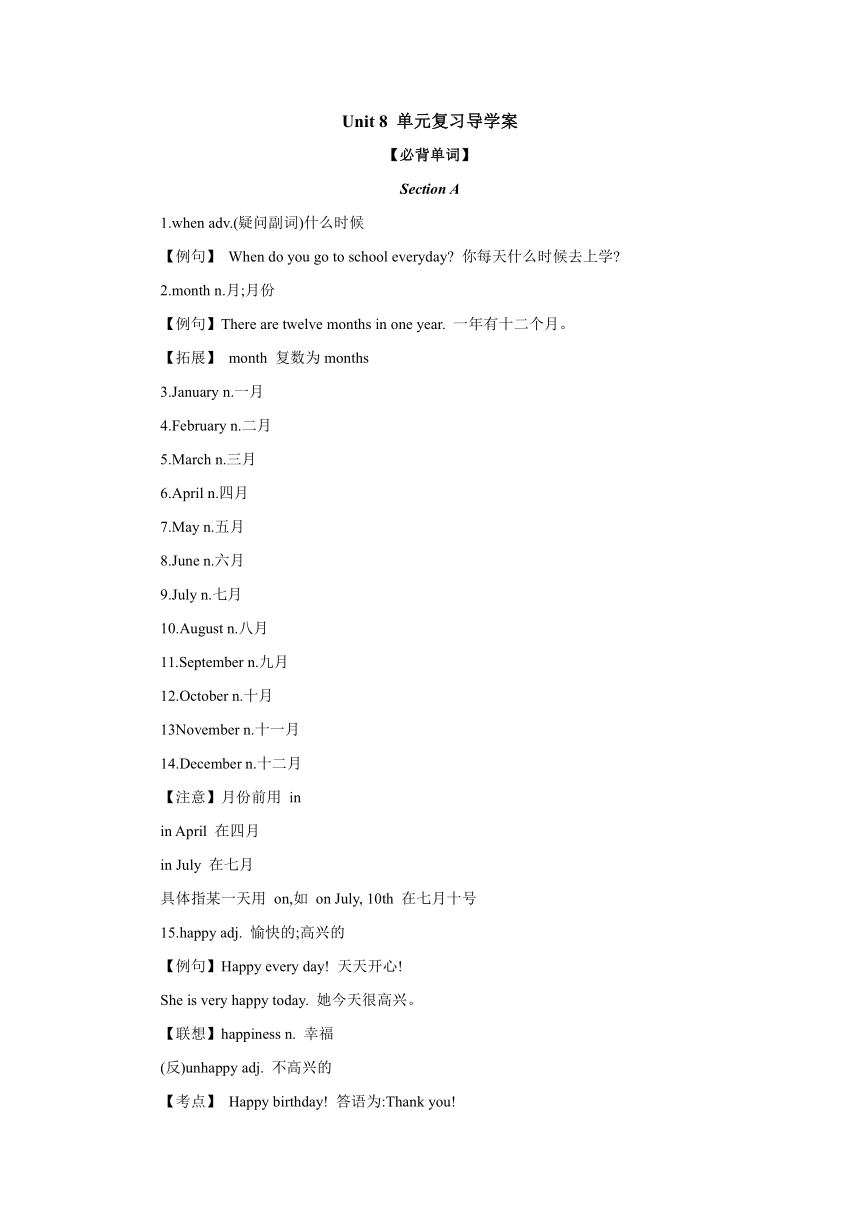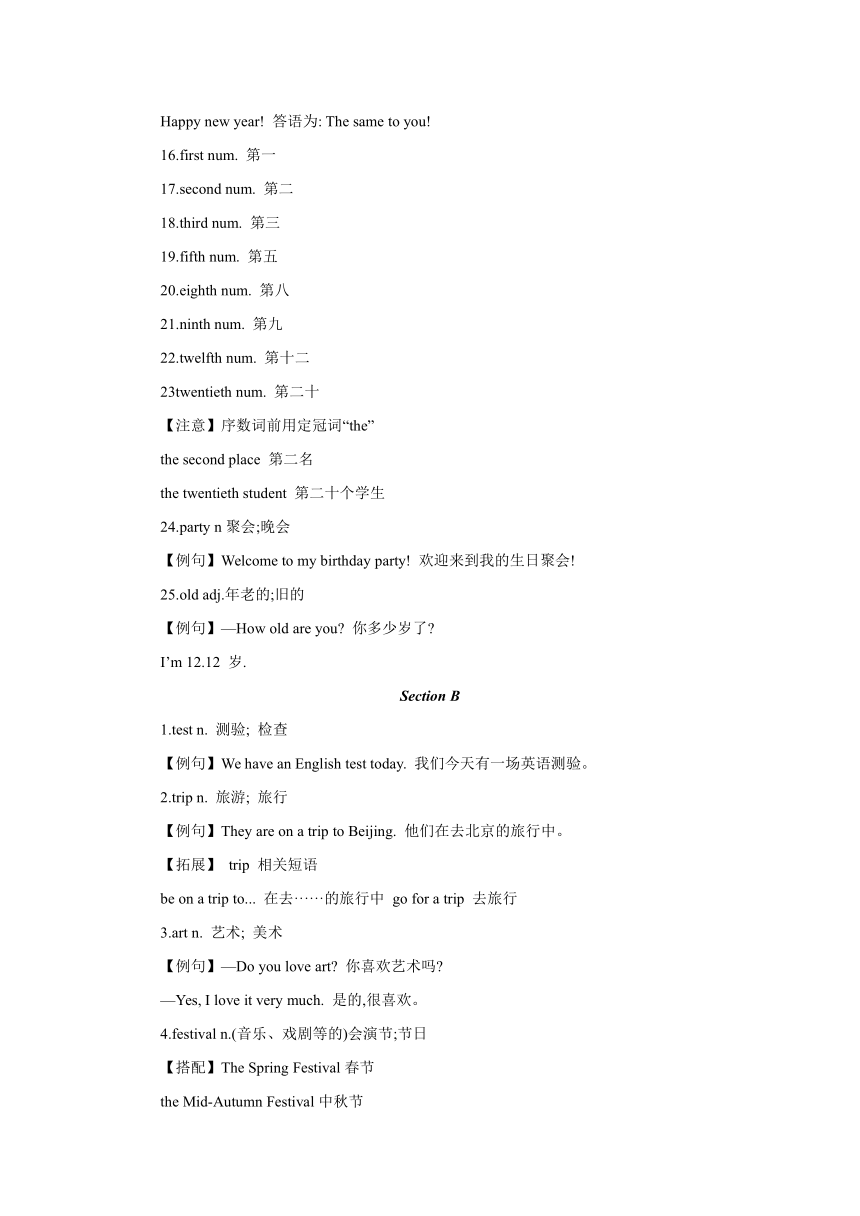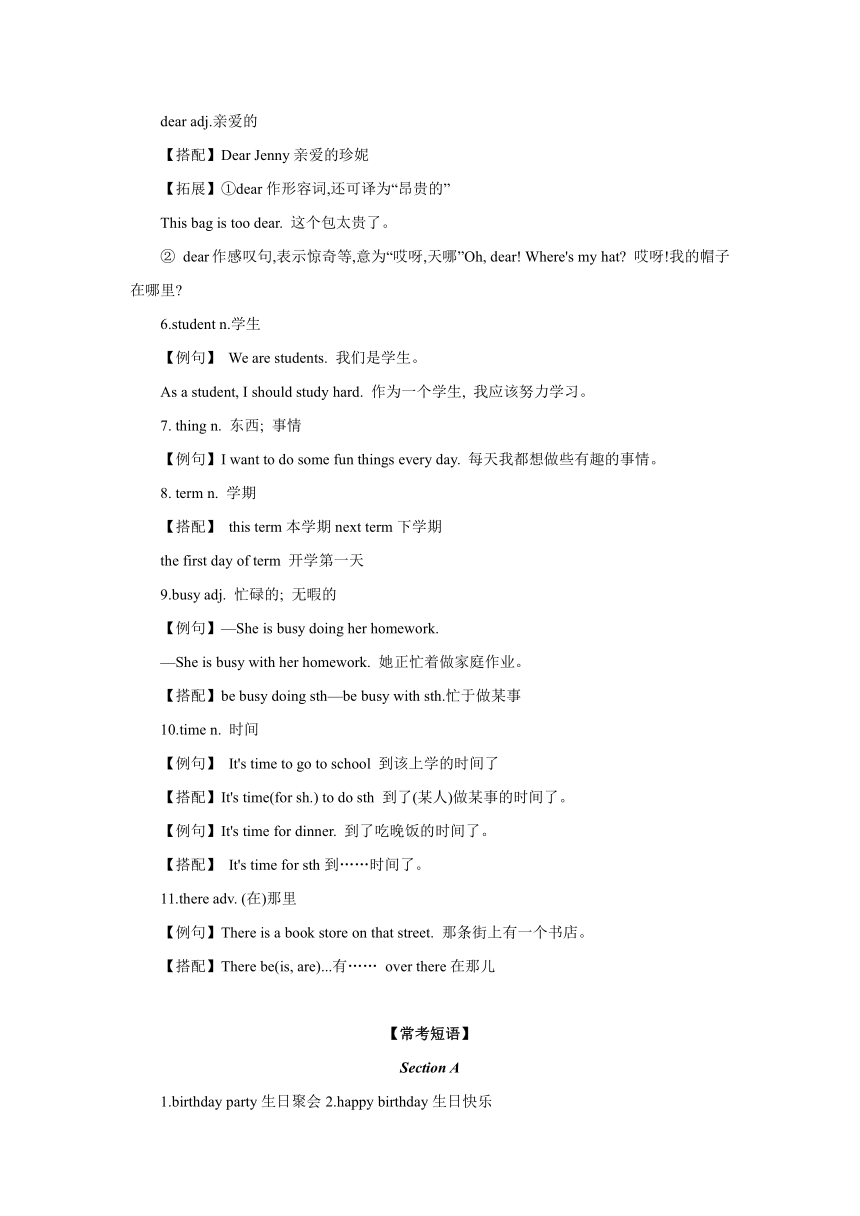人教版英语七年级上册Unit 8 When is your birthday? 单元复习 导学案
文档属性
| 名称 | 人教版英语七年级上册Unit 8 When is your birthday? 单元复习 导学案 |  | |
| 格式 | docx | ||
| 文件大小 | 19.1KB | ||
| 资源类型 | 教案 | ||
| 版本资源 | 人教新目标(Go for it)版 | ||
| 科目 | 英语 | ||
| 更新时间 | 2022-12-07 15:56:35 | ||
图片预览



文档简介
Unit 8 单元复习导学案
【必背单词】
Section A
1.when adv.(疑问副词)什么时候
【例句】 When do you go to school everyday 你每天什么时候去上学
2.month n.月;月份
【例句】There are twelve months in one year. 一年有十二个月。
【拓展】 month 复数为months
3.January n.一月
4.February n.二月
5.March n.三月
6.April n.四月
7.May n.五月
8.June n.六月
9.July n.七月
10.August n.八月
11.September n.九月
12.October n.十月
13November n.十一月
14.December n.十二月
【注意】月份前用 in
in April 在四月
in July 在七月
具体指某一天用 on,如 on July, 10th 在七月十号
15.happy adj. 愉快的;高兴的
【例句】Happy every day! 天天开心!
She is very happy today. 她今天很高兴。
【联想】happiness n. 幸福
(反)unhappy adj. 不高兴的
【考点】 Happy birthday! 答语为:Thank you!
Happy new year! 答语为: The same to you!
16.first num. 第一
17.second num. 第二
18.third num. 第三
19.fifth num. 第五
20.eighth num. 第八
21.ninth num. 第九
22.twelfth num. 第十二
23twentieth num. 第二十
【注意】序数词前用定冠词“the”
the second place 第二名
the twentieth student 第二十个学生
24.party n聚会;晚会
【例句】Welcome to my birthday party! 欢迎来到我的生日聚会!
25.old adj.年老的;旧的
【例句】—How old are you 你多少岁了
I’m 12.12 岁.
Section B
1.test n. 测验; 检查
【例句】We have an English test today. 我们今天有一场英语测验。
2.trip n. 旅游; 旅行
【例句】They are on a trip to Beijing. 他们在去北京的旅行中。
【拓展】 trip 相关短语
be on a trip to... 在去······的旅行中 go for a trip 去旅行
3.art n. 艺术; 美术
【例句】—Do you love art 你喜欢艺术吗
—Yes, I love it very much. 是的,很喜欢。
4.festival n.(音乐、戏剧等的)会演节;节日
【搭配】The Spring Festival春节
the Mid-Autumn Festival中秋节
dear adj.亲爱的
【搭配】Dear Jenny亲爱的珍妮
【拓展】①dear作形容词,还可译为“昂贵的”
This bag is too dear. 这个包太贵了。
② dear作感叹句,表示惊奇等,意为“哎呀,天哪”Oh, dear! Where's my hat 哎呀!我的帽子在哪里
6.student n.学生
【例句】 We are students. 我们是学生。
As a student, I should study hard. 作为一个学生, 我应该努力学习。
7. thing n. 东西; 事情
【例句】I want to do some fun things every day. 每天我都想做些有趣的事情。
8. term n. 学期
【搭配】 this term本学期next term下学期
the first day of term 开学第一天
9.busy adj. 忙碌的; 无暇的
【例句】—She is busy doing her homework.
—She is busy with her homework. 她正忙着做家庭作业。
【搭配】be busy doing sth—be busy with sth.忙于做某事
10.time n. 时间
【例句】 It's time to go to school 到该上学的时间了
【搭配】It's time(for sh.) to do sth 到了(某人)做某事的时间了。
【例句】It's time for dinner. 到了吃晚饭的时间了。
【搭配】 It's time for sth到……时间了。
11.there adv. (在)那里
【例句】There is a book store on that street. 那条街上有一个书店。
【搭配】There be(is, are)...有…… over there在那儿
【常考短语】
Section A
1.birthday party生日聚会2.happy birthday生日快乐
3.how old多大年纪/几岁
4.see you 再见
5.in August 在八月
Section B
1.Sports Day 体育节
2.art festival 艺术节
3.havea good time 过得愉快
4.English test 英语测验
5.school trip 学校旅行
6.basketball game 篮球比赛
7.School Day 校庆日
8.book sale 图书销售
【重点句型】
Section A
1When is your birthday, Linda 琳达你的生日是什么时候
(1)when 疑问副词,意为“什么时候”,引导特殊疑问句,可以对年、月、日以及时刻进行提问或者询问某一动作发生的时间。其结构为“When十一般疑问可 ”。回答时常用 at,in,on 等引导的表示时间的介词短语。
【例句】—When do you come to China 你什么时候来中国
—In April. 在4月。
—When are you at home 你什么时候在家
—I am at home on Sunday. 我周日在家。
(2)询问某人生日的常用句型为:When is sb’s birthday 其答语可用:My/His/Her birthday is (on)… 或It's(on)...
【例句】—When is Mary’s birthday 玛丽的生日是什么时候
Her birthday is (on) February 6th. /It's (on) February 6th. 她的生日是(在)2月6日。/是(在)2月6日。
【拓展】what time意为“几点钟”用于询问具体的时刻
—What time do you go to school 你几点去上学
—At 6;30.在6点30(去上学)。
What time is it 几点了
2.So, how old are you, Alan 那么,你多大了,艾伦
(1)how old 意为“多大年纪;几岁了”,引导特殊疑问句,询问年龄。
其结构为“How old+be+主语 ”,相当于“What’s one's age ”,其答语为“主语+谓语+基数词(+years old).”
【例句】—How old is Bob /What's Bobs age 鲍勃多大了
—He is 13. 他13 岁。
(2)old 形容词,意为“年老的;旧的”。old 是以元音音素开头的单词,修饰单数名词时,其前若用不定冠词应用an。
【例句】 He is very old他很老了。Mr. Green is an old man. 格林先生是一位老人。
This is an old bike. 这是一辆旧自行车。
That’s an old box那是个旧箱子。
【拓展】介词in 和at 也可用于时间前。in 常用于年季节、月份、上午、下午或晚上前;at 常用于具体时刻或某些固定搭配中。
in 2017 在2017年
in the morning 在上午
at 8 o'clock 在8点钟at noon/night/the age of 在中午/晚上/……岁时
Section B
1. Your parents can come to our school. 你们的父母可以来我们学校。
can 情态动词,意为“能”,可表示能力,也可以表示许可。它没有人称和数的变化,后接动词原形。其否定形式为 can’t。
【例句】 He can run very fast. 他能跑得很快。
You can go home now. 现在你可以回家了。
—Can you play the drums 你会打鼓吗
—Yes, I can./No, I can’t. 是的.我会。/不,我不会。
【注意】含有情态动词的陈述句在变为一般疑问句时,要把情态动词提前;变为否定句时,在情态动词后加 not。
【例句】—Can you see the ball under the chair 你能看到椅子下面的那个球吗
—No,I can't see it. 不,我看不见(那个球)。
【语法总结】
序数词
1.序数词的定义:表示事物的顺序的数词叫序数词。它的作用相当于名词或形容词,可作主语、宾语、定语或表语。
2.序数的成:
基数词要变为序数词是有规律可循的,其方法及具体示例如下:
方法 示例
一般情况下在基数词后加-th Six-sixth Fourteen-fourteenth
整十的序数词的构成是把对应的基数词词尾的y变ie, 再加-th Thirty-thirtieth Eighty-eightieth
非整十的两位数或两位以上的基数词变为序数词时,只将个位数变为序数词 Twenty-two – twenty-second One hundred and sixty-five – one hundred and sixty-fifth
特殊变化的基数词1、2、3、5、8、9、12需单独记忆 One-first two-second three-third five-fifth eight-eighth nine-ninth twelve-twelfth
3.序数词的用法:
①序数词前一般要加定冠词 the 表示顺序
The Yellow River is the second longest river in China.黄河是中国第二长河。
②序数词常用作名词的定语,但当名词前已有形容词性物主代词等限定词时,则不再用定冠词 the。
her fourth birthday她的四岁生日
③序数词前有时也可用不定冠词 a/an,这时不再表示在具体范围内的“第几”而是表示在原有基础上的“又一个,另一个”
I think I must do it a second time. 我想这件事我必须再做一次。(已做过一次)
④表示编号时,常把基数词放在名词后面来表示顺序,相当于“the+序数词+名词”
Lesson Five=the fifth lesson 第大课
4.序数词的缩写:
序数词的缩写形式是由阿拉伯数字加上序数词的最后两个字母构成的。first—lst第一 second—2nd第二 third——3rd第三 fourth——4th第四
1 Today is Jack's _________ birthday. He is 12 years old.
A. twelve B. twelveth C. twelfth D. the twelfth
2 All the teachers in our school live on ________ floor.
A. the second B. two C. second D. the two
【必背单词】
Section A
1.when adv.(疑问副词)什么时候
【例句】 When do you go to school everyday 你每天什么时候去上学
2.month n.月;月份
【例句】There are twelve months in one year. 一年有十二个月。
【拓展】 month 复数为months
3.January n.一月
4.February n.二月
5.March n.三月
6.April n.四月
7.May n.五月
8.June n.六月
9.July n.七月
10.August n.八月
11.September n.九月
12.October n.十月
13November n.十一月
14.December n.十二月
【注意】月份前用 in
in April 在四月
in July 在七月
具体指某一天用 on,如 on July, 10th 在七月十号
15.happy adj. 愉快的;高兴的
【例句】Happy every day! 天天开心!
She is very happy today. 她今天很高兴。
【联想】happiness n. 幸福
(反)unhappy adj. 不高兴的
【考点】 Happy birthday! 答语为:Thank you!
Happy new year! 答语为: The same to you!
16.first num. 第一
17.second num. 第二
18.third num. 第三
19.fifth num. 第五
20.eighth num. 第八
21.ninth num. 第九
22.twelfth num. 第十二
23twentieth num. 第二十
【注意】序数词前用定冠词“the”
the second place 第二名
the twentieth student 第二十个学生
24.party n聚会;晚会
【例句】Welcome to my birthday party! 欢迎来到我的生日聚会!
25.old adj.年老的;旧的
【例句】—How old are you 你多少岁了
I’m 12.12 岁.
Section B
1.test n. 测验; 检查
【例句】We have an English test today. 我们今天有一场英语测验。
2.trip n. 旅游; 旅行
【例句】They are on a trip to Beijing. 他们在去北京的旅行中。
【拓展】 trip 相关短语
be on a trip to... 在去······的旅行中 go for a trip 去旅行
3.art n. 艺术; 美术
【例句】—Do you love art 你喜欢艺术吗
—Yes, I love it very much. 是的,很喜欢。
4.festival n.(音乐、戏剧等的)会演节;节日
【搭配】The Spring Festival春节
the Mid-Autumn Festival中秋节
dear adj.亲爱的
【搭配】Dear Jenny亲爱的珍妮
【拓展】①dear作形容词,还可译为“昂贵的”
This bag is too dear. 这个包太贵了。
② dear作感叹句,表示惊奇等,意为“哎呀,天哪”Oh, dear! Where's my hat 哎呀!我的帽子在哪里
6.student n.学生
【例句】 We are students. 我们是学生。
As a student, I should study hard. 作为一个学生, 我应该努力学习。
7. thing n. 东西; 事情
【例句】I want to do some fun things every day. 每天我都想做些有趣的事情。
8. term n. 学期
【搭配】 this term本学期next term下学期
the first day of term 开学第一天
9.busy adj. 忙碌的; 无暇的
【例句】—She is busy doing her homework.
—She is busy with her homework. 她正忙着做家庭作业。
【搭配】be busy doing sth—be busy with sth.忙于做某事
10.time n. 时间
【例句】 It's time to go to school 到该上学的时间了
【搭配】It's time(for sh.) to do sth 到了(某人)做某事的时间了。
【例句】It's time for dinner. 到了吃晚饭的时间了。
【搭配】 It's time for sth到……时间了。
11.there adv. (在)那里
【例句】There is a book store on that street. 那条街上有一个书店。
【搭配】There be(is, are)...有…… over there在那儿
【常考短语】
Section A
1.birthday party生日聚会2.happy birthday生日快乐
3.how old多大年纪/几岁
4.see you 再见
5.in August 在八月
Section B
1.Sports Day 体育节
2.art festival 艺术节
3.havea good time 过得愉快
4.English test 英语测验
5.school trip 学校旅行
6.basketball game 篮球比赛
7.School Day 校庆日
8.book sale 图书销售
【重点句型】
Section A
1When is your birthday, Linda 琳达你的生日是什么时候
(1)when 疑问副词,意为“什么时候”,引导特殊疑问句,可以对年、月、日以及时刻进行提问或者询问某一动作发生的时间。其结构为“When十一般疑问可 ”。回答时常用 at,in,on 等引导的表示时间的介词短语。
【例句】—When do you come to China 你什么时候来中国
—In April. 在4月。
—When are you at home 你什么时候在家
—I am at home on Sunday. 我周日在家。
(2)询问某人生日的常用句型为:When is sb’s birthday 其答语可用:My/His/Her birthday is (on)… 或It's(on)...
【例句】—When is Mary’s birthday 玛丽的生日是什么时候
Her birthday is (on) February 6th. /It's (on) February 6th. 她的生日是(在)2月6日。/是(在)2月6日。
【拓展】what time意为“几点钟”用于询问具体的时刻
—What time do you go to school 你几点去上学
—At 6;30.在6点30(去上学)。
What time is it 几点了
2.So, how old are you, Alan 那么,你多大了,艾伦
(1)how old 意为“多大年纪;几岁了”,引导特殊疑问句,询问年龄。
其结构为“How old+be+主语 ”,相当于“What’s one's age ”,其答语为“主语+谓语+基数词(+years old).”
【例句】—How old is Bob /What's Bobs age 鲍勃多大了
—He is 13. 他13 岁。
(2)old 形容词,意为“年老的;旧的”。old 是以元音音素开头的单词,修饰单数名词时,其前若用不定冠词应用an。
【例句】 He is very old他很老了。Mr. Green is an old man. 格林先生是一位老人。
This is an old bike. 这是一辆旧自行车。
That’s an old box那是个旧箱子。
【拓展】介词in 和at 也可用于时间前。in 常用于年季节、月份、上午、下午或晚上前;at 常用于具体时刻或某些固定搭配中。
in 2017 在2017年
in the morning 在上午
at 8 o'clock 在8点钟at noon/night/the age of 在中午/晚上/……岁时
Section B
1. Your parents can come to our school. 你们的父母可以来我们学校。
can 情态动词,意为“能”,可表示能力,也可以表示许可。它没有人称和数的变化,后接动词原形。其否定形式为 can’t。
【例句】 He can run very fast. 他能跑得很快。
You can go home now. 现在你可以回家了。
—Can you play the drums 你会打鼓吗
—Yes, I can./No, I can’t. 是的.我会。/不,我不会。
【注意】含有情态动词的陈述句在变为一般疑问句时,要把情态动词提前;变为否定句时,在情态动词后加 not。
【例句】—Can you see the ball under the chair 你能看到椅子下面的那个球吗
—No,I can't see it. 不,我看不见(那个球)。
【语法总结】
序数词
1.序数词的定义:表示事物的顺序的数词叫序数词。它的作用相当于名词或形容词,可作主语、宾语、定语或表语。
2.序数的成:
基数词要变为序数词是有规律可循的,其方法及具体示例如下:
方法 示例
一般情况下在基数词后加-th Six-sixth Fourteen-fourteenth
整十的序数词的构成是把对应的基数词词尾的y变ie, 再加-th Thirty-thirtieth Eighty-eightieth
非整十的两位数或两位以上的基数词变为序数词时,只将个位数变为序数词 Twenty-two – twenty-second One hundred and sixty-five – one hundred and sixty-fifth
特殊变化的基数词1、2、3、5、8、9、12需单独记忆 One-first two-second three-third five-fifth eight-eighth nine-ninth twelve-twelfth
3.序数词的用法:
①序数词前一般要加定冠词 the 表示顺序
The Yellow River is the second longest river in China.黄河是中国第二长河。
②序数词常用作名词的定语,但当名词前已有形容词性物主代词等限定词时,则不再用定冠词 the。
her fourth birthday她的四岁生日
③序数词前有时也可用不定冠词 a/an,这时不再表示在具体范围内的“第几”而是表示在原有基础上的“又一个,另一个”
I think I must do it a second time. 我想这件事我必须再做一次。(已做过一次)
④表示编号时,常把基数词放在名词后面来表示顺序,相当于“the+序数词+名词”
Lesson Five=the fifth lesson 第大课
4.序数词的缩写:
序数词的缩写形式是由阿拉伯数字加上序数词的最后两个字母构成的。first—lst第一 second—2nd第二 third——3rd第三 fourth——4th第四
1 Today is Jack's _________ birthday. He is 12 years old.
A. twelve B. twelveth C. twelfth D. the twelfth
2 All the teachers in our school live on ________ floor.
A. the second B. two C. second D. the two
同课章节目录
- starters 预备篇(2012秋审查)
- Unit 1 Good morning !
- Unit 2 What’s this in English?
- Unit 3 What color is it ?
- Unit 1 My name's Gina.
- Section A
- Section B
- Unit 2 This is my sister.
- Section A
- Section B
- Unit 3 Is this your pencil?
- Section A
- Section B
- Unit 4 Where's my schoolbag?
- Section A
- Section B
- Unit 5 Do you have a soccer ball?
- Section A
- Section B
- Unit 6 Do you like bananas?
- Section A
- Section B
- Unit 7 How much are these socks?
- Section A
- Section B
- Unit 8 When is your birthday?
- Section A
- Section B
- Unit 9 My favorite subject is science.
- Section A
- Section B
